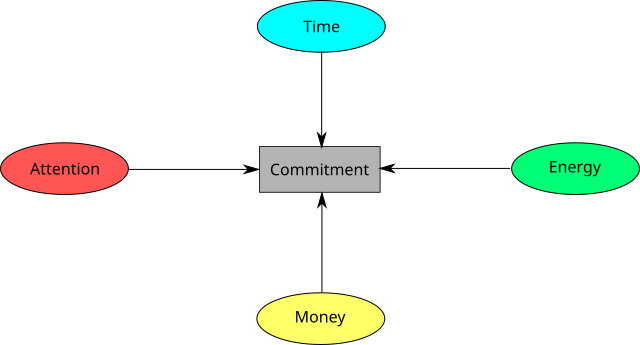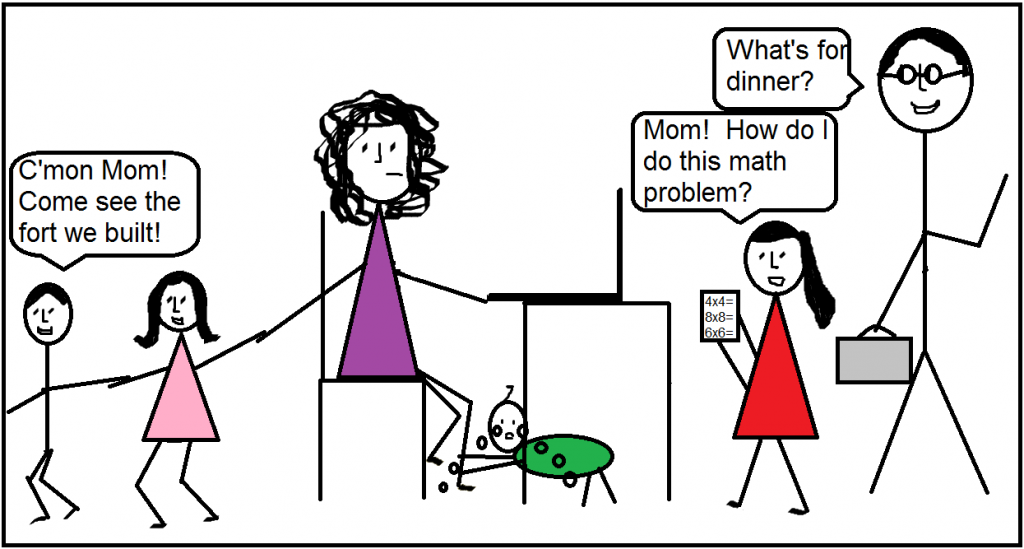Commitment. The word makes us see a picture of dedication, consistency and succeeding against the odds. Everyone is committed to something, be it a relationship, a project, a goal or simply living life well. But how well do you understand the word commitment? How consciously have you chosen yours? Are you happy with your commitments? Every morning, do you look forward eagerly to the rest of the day? Or are you simply grinding out your days with a feeling of unfulfillment?
In this post, I will discuss what a commitment is, what a commitment requires of you, whether simultaneous commitments are really possible and how to identify and follow commitments that help you get exactly what you want out of your life.
What is a commitment?

To understand commitments, let’s define the term in simple language. A commitment is an activity that requires intensive use of one or more of attention, energy, money or time, such that having another commitment simultaneously is either impossible due to limited resources or makes your life chaotic.
Length of a commitment
Commitments can be ultra-short or life-long.

- Listening to a song with the intention of learning its lyrics is a commitment that probably takes a couple of minutes every day for the next one week.
- Driving from home to your office on your own is a commitment that spans a few minutes to a couple of hours.
- Learning a new language with the intention of conversational fluency takes two to eight months, depending on the language’s grammatical nuances.
- Buying a home and paying off its loan is a commitment that takes a decade or more. Raising your child from infancy to his/her independence takes about the same time.
- Staying married lasts half your lifetime, sometimes more.
- Other commitments such as staying vegan may vary based on your preference. Some people turn vegan only during religious days/months, while others want to stay vegan throughout life.
Can we have multiple commitments together?
Multiple commitments are possible as long as they don’t compete for the same resource, i.e. attention, time, money and energy. Two commitments that require the same resources simultaneously are DEFINITELY NOT POSSIBLE. Even if barely possible, they’ll throw your life out of balance.

- Driving your car to work and choosing to learn Spanish using a podcast at the same time don’t work well together. Both require ATTENTION.
While driving on a narrow road with traffic, taking exits or reading highway signs, you tune out some important lines from the Spanish lesson.
Alternatively, if you pay too much attention to the lesson, you may miss an exit, hit a speed breaker at high speed or cause a collision.
Driving your car and doing facial exercises work well. Driving requires ATTENTION, while facial exercises require ENERGY. - Expanding your business and raising a child don’t often mix well. Both require TIME.
You will often miss your child’s stage performances on the days your business is floundering and needs more of your time.
Or if you prioritise your child, then you cannot expand a small self-run business to international timings since other countries may work when you are reading bedtime stories to your little one. - Quitting a lousy job while you still have unfinished home loan payments doesn’t work well.
Paying your home loan requires MONEY and that comes from the job. Unless you have a reliable source of income from another stream, you cannot even think of quitting your job if you want to service your loan and keep your home. - It is difficult to learn salsa and train for a marathon at the same time.
Dancing salsa takes different types of moves than running a marathon. But both consume ENERGY. Pursuing both at the same time may run you ragged.
A better idea is to complete learning salsa this year and participate in next year’s marathon. Another idea is to postpone taking salsa lessons for now and seek a batch that starts after the marathon. - Even seemingly simple commitments like being vegan or going zero-waste require time, money, energy and attention in ways you never thought of.
On days that you want to eat out, veganism can force you to spend incredible amounts of time and attention in search of restaurants that don’t use any kind of dairy at all, not even butter for sauteing. Often you’ll find that you will cook for yourself all the time, with eating out being a distant memory. Every time you travel, veganism slows down your mealtime to a crawl as it forces you to scan the menu and make a choice only after you are sure that food items comply with your rules.
If you have been using an online vendor to deliver groceries to you, then a zero-waste approach will have you cancel that vendor because they deliver groceries only in one-time-use polythene bags. Instead, you will find yourself taking the drive to the local market, cloth bags and glass/plastic/steel containers in hand, and spending a considerable amount of time shopping for things as basic as salt and sugar.
Can I back out of commitments if I don’t like them?
Tricky question. The answer is ‘yes’ for some and ‘no’ for others.

Reverting from veganism to vegetarianism or non-vegetarianism is dead simple. Just re-introduce milk or meat into your next meal. The commitment to veganism or vegetarianism is just conceptual. Unless you are still sold on the principles of veganism, it is very much possible to simply reverse your mindset and start eating the things that you previously considered ‘unsuitable’.
If you have been driving to work, simply switch to taking the bus/train/metro/tube/monorail/subway/tram or even Uber for your next commute. That frees up time for reading, ideating, etc., instead of paying attention to driving yourself.
Backing out is not so simple for other commitments. Let’s say you have purchased a house and need to pay off the loan. And suddenly you find that a life where you work at a lousy job just to service the loan is suffocating.
Well, it is not very easy to resell the house to the builder or to sell it to someone else looking to buy a house. The process isn’t as simple as switching to veganism or taking a bus. Finding a prospect to buy the house, negotiating a price and doing the paperwork often take months.
Let’s say that your spouse and you welcome a bundle of joy after a lot of consideration and a determined willingness to become parents. A few months after the birth of the baby, you suddenly realise that being a parent is not for you. Or say the baby was adorable during infancy and you could manage the annoyances. But the grown child is getting on your nerves every day and suddenly you hate being a parent and wish there were a way out of it.
Well, way too late.
Parenting is an ultra-long-term and irreversible commitment. It takes time, attention, energy and money like no other commitment does. The commitment is for you to hold out until the child becomes an adult and is capable of taking care of him/herself, health, expenses and all.
I am confused about what my current commitments are.
Over the next month, watch all your activities closely and answer this question: What takes the bulk of my time, attention, energy and money?
Those are your commitments.
Are commitments chosen or handed down by others?
A mix of both. It depends on where you live, your upbringing, cultural conditioning, family, friends and your workplace. But unfortunately, I have observed that most commitments are handed down and you subconsciously practise them, whether you like them or not. Those commitments become expectations either from yourself or from others.

If your parents encourage you to follow your dreams, then your choice of career is perhaps exactly that: a choice. But plenty of youngsters are forced by parents or influenced by friends to take up certain higher studies such as law, medicine and engineering, even though their aptitude is to be a businessman/woman.
Your region’s weather or your family’s religion can force you to take up a dietary preference. It is extremely difficult to be a vegan in vegetation-unfriendly Siberia, whereas it is socially unacceptable to be a fish-eating Hindu Brahmin at Haridwar.
You are more likely to commit to buying and owning a house rather than renting one if everyone around you is buying beautiful houses. You are more likely to be a parent if you live in a joint family and everyone around you is expecting you to be a parent. You are more likely to become an army man if you come from a family of army men.
As a freelancer or a business owner, you will often choose your professional commitments. But as an employee, your boss will choose your assignments for you.
How do I choose my commitments to be happy?

- Take a long sheet of paper and make 5 columns.
- Label the columns as Commitment, Time, Attention, Money, Energy.
- Fill up the commitment column with a list of all the commitments that you already have and then the activities that fascinate you.
- Tick each of the other columns based on the resources required by each commitment. Commitments that take long hours from your every day are time-hungry. Commitments that need you to pay attention while tuning out everything else are attention-hungry. Commitments that are expensive are money-hungry. Commitments that can wear you down physically are energy-hungry.
Each commitment can be hungry for multiple resources too. E.g. committing to be a good photographer is time-hungry (take plenty of photos each day), attention-hungry (pay undivided attention to each photo while taking it) and money-hungry (buy all the costly gear). Committing to be a good parent needs all the resources. - After you complete the list, take your time and create a copy of the same list on another sheet of paper, but this time your commitments MUST be sorted from the one that makes you the happiest to the one that frustrates you the most.
This list can be quite revealing as it blows open your cover. If there is a huge difference between the original list and the sorted list you will see the pretence you have been living.
So revealing will this list be that you will realise that you have been living someone else’s life and not your own. It will make you doubly careful about saying ‘yes’ to any commitments in the future. - Now you need to choose your future commitments carefully from your list. Those are what you’ll be working on going forward.
But choose carefully. Make sure that you choose only one activity for each resource. There should be one time-hungry commitment, one energy-hungry, one attention-hungry and one money-hungry.
You may choose two of each, but it usually doesn’t work out. Choose a second commitment for each resource with a pinch of salt, i.e. you should be ready to drop it if your first choice for that same resource takes more. - Make peace with irreversible commitments. They are your reality. So find a way to get happiness from it. For everything else, you should back out of unpleasant commitments and introduce new ones that make you happy.
Conclusion
Commitments consume our most precious resources and consume a large part of our lives. Yet, we often do not consciously choose them in a way that makes us happy or our life more enriching.
So respect commitments for what they are. Choose them wisely. On your own accord. Do not choose them randomly. Or because someone advised you to. Or because someone else chose it. And definitely not because you want to one-up someone.
